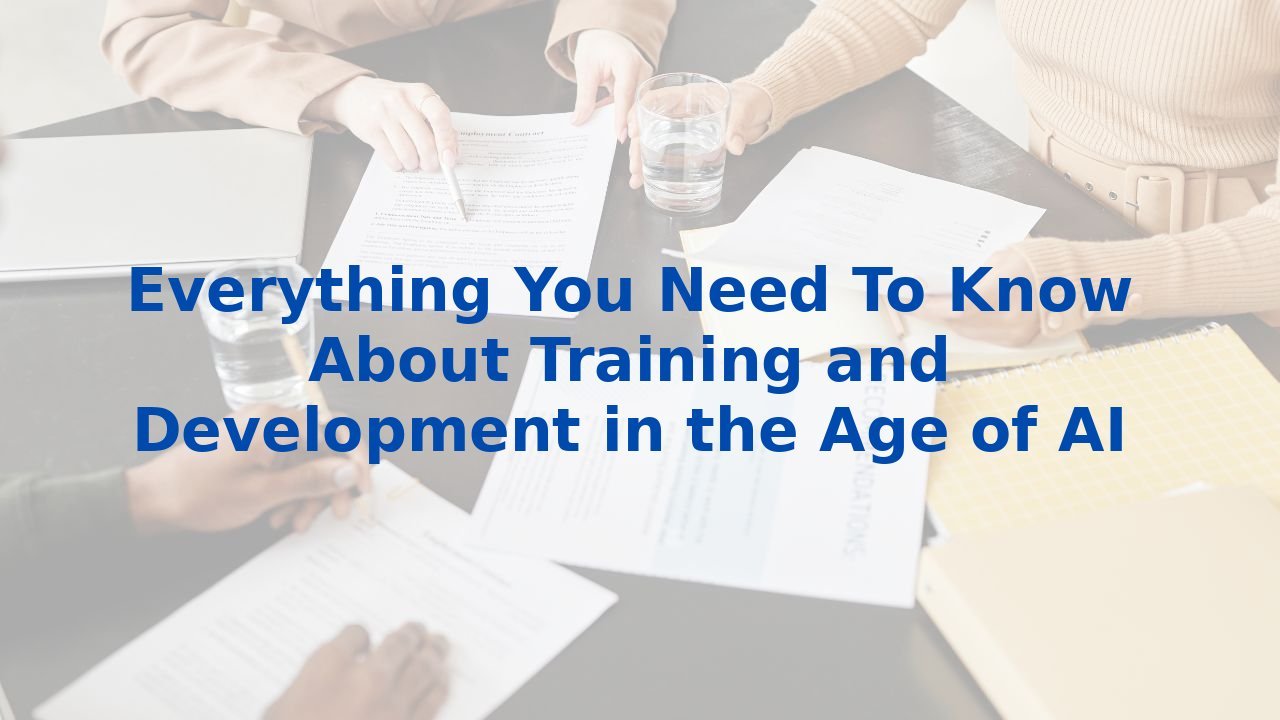Everything You Need To Know About Training and Development in the Age of AI
The Pillar of Business: Training and Development in the Age of AI
Introduction
In today's rapidly changing business landscape, training stands as a fundamental component of human resource development and organizational success. It's not just about enhancing knowledge, skills, and abilities; training cultivates a culture of continuous improvement that drives performance and innovation. With the integration of artificial intelligence (AI), training and development have undergone a profound transformation, streamlining processes that were once manual and time-consuming. This blog post explores the significance of training in the context of AI and illustrates how businesses can leverage these advanced methods for optimal outcomes.
Types of Training
When we think of training, several types come to mind. Each plays a crucial role, enriched further by AI enhancements:
- Orientation Training
This introduces new employees to the company, its culture, and their specific roles. With AI, organizations can personalize onboarding, offering tailored learning modules and interactive simulations that reduce the time it takes for new hires to become productive. - Skill-Based Training
Focused on developing specific job-related skills, AI can deliver real-time feedback and adaptive learning paths. Imagine AI assessing an employee's software proficiency and immediately providing tailored training to fill knowledge gaps. - Management Training
Aimed at developing leadership skills, AI provides data-driven insights and predictive analytics to support informed decision-making. AI-driven simulations allow aspiring managers to practice their skills in a safe, controlled environment. - Professional Development
This helps employees expand their careers. AI can analyze career trajectories and suggest personalized development plans, driving motivation and engagement.
Training Methods
Understanding the right methods to implement training is just as crucial:
- On-the-Job Training
Learning by doing, AI enhances this method by offering performance metrics and real-time feedback, enabling a faster learning curve. - Off-the-Job Training
Classroom training can become more impactful with AI, which offers customized learning paths and immersive experiences, like Virtual Reality (VR) and Augmented Reality (AR). - E-Learning
Online modules benefit from AI's capability to create adaptive learning paths and provide instant assessments. AI chatbots can assist, answering questions and providing support. - Simulations
AI can make simulations more realistic, allowing employees to navigate real-life scenarios, ensuring preparedness while minimizing risks.
Importance of Training
The significance of training goes far beyond immediate skill enhancement:
- Improved Performance
Efficient training drives enhanced productivity. With AI monitoring performance metrics, employees receive ongoing support in skill refinement. - Increased Employee Satisfaction
When training is personalized, it boosts morale and engagement. Employees appreciate an investment in their development. - Reduced Turnover
Career growth opportunities instill loyalty. By leveraging AI to identify advancement paths, organizations can nurture their talent. - Enhanced Innovation
AI supports creativity and problem-solving. By offering actionable insights, employees are empowered to develop innovative solutions. - Competitive Advantage
Skilled workforces outpace competitors. Embracing AI-driven training cultivates teams adept at navigating modern challenges.
Benefits of Training Your Employees for AI
Training isn't just about enhancing traditional skills; it’s about preparing for the future. Training employees for AI comes with its unique set of benefits:
- Enhanced Efficiency
Automating aspects of training enables resources to focus on strategic initiatives, amplifying organizational productivity. - Improved Accuracy
AI ensures that training materials are current and relevant, thus minimizing risks associated with outdated methodologies. - Personalization
Training experiences can be tailored to individual needs, leading to higher engagement and retention of information. - Scalability
AI efficiently manages extensive training data, allowing training programs to grow alongside the workforce.
Conclusion
As we delve deeper into the age of AI, training remains pivotal. However, it's the integration of AI that transforms training into a dynamic, responsive, and highly personalized experience. Organizations that capitalize on AI-driven methods will not only enhance employee performance and satisfaction but will also carve out a competitive edge in their respective markets. The future is here—those willing to invest in AI literacy and adaptive training programs will undoubtedly thrive in this new landscape. Explore more insights and resources on AI training programs to prepare your workforce for tomorrow.



